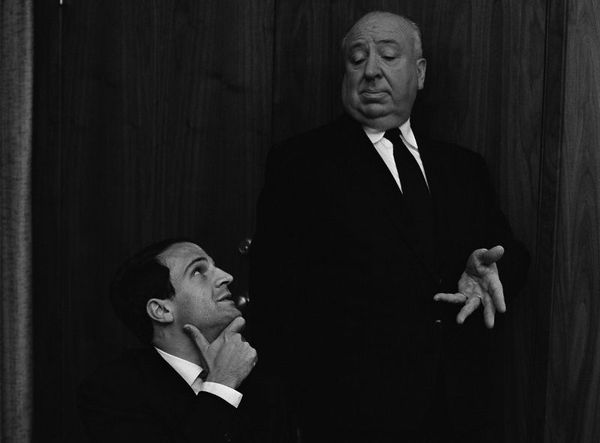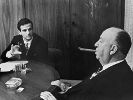Eye For Film >> Movies >> Hitchcock/Truffaut (2015) Film Review
Hitchcock/Truffaut
Reviewed by: Anne-Katrin Titze

Wes Anderson read the paperback so much that it fell apart. Paul Schrader talks about how important Truffaut's interview was for him to learn about his craft. Peter Bogdanovich explains that people's opinions of Hitchcock changed and Martin Scorsese calls the endeavor "really revolutionary." Arnaud Desplechin sees no difference between what makes him "shiver with fear or with love."
David Fincher questions editing behavior over time and Richard Linklater muses about how Hitchcock is "never not confident in every shot." Olivier Assayas calls him a "theoretician of space," and Kiyoshi Kurosawa sees Truffaut's book (Le Cinéma Selon Hitchcock) "almost as if it were a bible" for filmmakers.

Kent Jones, together with his co-writer, Cinémathèque Française Director Serge Toubiana, took on the challenge of turning the epic 50-hour 500-question interview between Alfred Hitchcock and François Truffaut into a compact script for an 80-minute documentary, using excerpts from the original audio. Bob Balaban makes a fine narrator, as he proved in Moonrise Kingdom. Here he guides us through the film off camera and sans duck boots (or maybe not). At the world premiere in Cannes, the English language version was screened. Mathieu Amalric does the narration for the French version.
For eight days in 1962, the two charismatic directors discussed Hitchcock's career up to that point, going film by film - a meeting that resulted in Truffaut's groundbreaking book. Jones, with carefully paced rhythm, put together clips from the master's oeuvre and others', with commentary by some of the best filmmakers working today, speaking about the impact of the conversations and what Hitchcock means to them in general.
We watch the directors describe specific scenes. The steering wheel in the shot of Janet Leigh driving in Psycho or why the British Man Who Knew Too Much could be the first full-fledged Hitchcock, are things most viewers wouldn't contemplate. This is where the dialogue is continued beyond the graves of Hitchcock and Truffaut, who died a mere four years after Hitchcock, at age 52.
Vertigo looms largest. James Gray explains why it is sublime that we never see Madeleine's face in the museum looking at the painting and how he and other non-Hitchcocks would probably have shot her from the front, because "we're not that good." Scorsese gives marvelous insight into his understanding of the man who perfected the "religious angle" and why "plot is just a line that you hang things on."
The timing in Hitchcock/Truffaut can be comical and to the point. A comment by Fincher, stating "what I love about Vertigo is it's just so perverted", is followed by a clip of James Stewart pressuring Kim Novak. "Judy, please, it can't matter to you!" He implores her to change her hair color. The abyss that suddenly opens wide can only be shielded by our laughter. And the scene in the flower shop, gives me chills of pleasure from the colours alone - no matter how often I see it.
All good documentaries on cinema make you want to discover and re-discover what they are about. In the context of The Paradine Case and Rear Window, Truffaut and Hitchcock talk about not wasting certain shots and saving images for future use. Hitchcock/Truffaut has the intriguing aura of a first episode with all the questions answered easily producing 500 more to be asked.
I wondered, though, why not one single female director was involved, when ultimately, Hitchcock's work is about "moral dilemmas", and these are definitely not an exclusively male prerogative.
Reviewed on: 01 Dec 2015
















